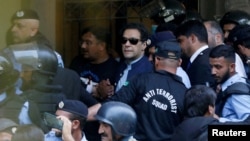Pakistan’s top court Friday approved the post-arrest bail of former Prime Minister Imran Khan in a lawsuit stemming from charges that while in office he made public state secrets involving the United States.
The Supreme Court’s ruling is a legal victory for Khan, but it does not mean the embattled 71-year-old former Pakistani leader will be able to leave jail, where he has been held since early August after being convicted of corruption.
The verdict came in response to Khan’s petition against his closed-door trial conducted by a special court inside the jail on charges he leaked to the public the contents of a confidential diplomatic cable, known as a cypher, violating the country’s Official Secrets Act.
While accepting Khan’s petition, Pakistan’s three-judge Supreme Court panel ruled “there is no sufficient incriminating material available, at this stage, which could show that the petitioner … communicated the information contained in the cypher telegram … to the public at large.”
The cypher was sent to Islamabad by Pakistan’s ambassador in Washington in March 2022, a month before a parliamentary vote of no-confidence removed Khan from power. Khan swiftly rejected the vote as an outcome of the U.S. “conspiracy.”
The cricket hero-turned-prime minister claimed the cypher had documented the U.S. role in the toppling of his government with the help of the Pakistani military to punish him for visiting Moscow a day before Russia invaded Ukraine. Washington and the Pakistani military deny the charges.
Khan has dismissed the Official Secrets Act charge and dozens of other lawsuits filed by authorities against him since his ouster, accusing the military of manufacturing them to prevent him and his Pakistan Tehreek-e-Insaf, or PTI, party from contesting national elections set for February 8.
Khan remains the most popular national politician, and his PTI is rated as the largest political force in the country of about 241 million people.
The PTI has increasingly complained that the military-backed authorities are cracking down on party candidates to prevent them from filing nomination papers for the coming elections.
The opposition party released a statement from Khan earlier Friday, warning that attempts to force “the largest political party of the country out of the electoral race” would threaten the stability of Pakistan.
He was quoted as saying that “coercive and brutal attempts were being made to oust the PTI candidates from the election process by arresting them illegally, snatching their nomination papers and harassing them.”
Pakistan’s caretaker Prime Minister Anwaar-ul-Haq Kakar has repeatedly stated that his government is determined to hold “free, fair and transparent” general elections. Critics are skeptical about official pledges, however, citing almost daily raids on homes and offices of PTI candidates.
The opposition party says it cannot hold election rallies or meetings because of the crackdown on supporters. Last week, the PTI organized the country’s first virtual rally, drawing upwards of 1.5 million YouTube views and hundreds of thousands on other social media platforms.
PTI and independent global internet monitors confirmed nationwide internet disruptions during the rally, effectively blocking access to major social media platforms, including Instagram, X (formerly Twitter) and Facebook, from within Pakistan.
During a recent press briefing, U.S. State Department spokesperson Matthew Miller was asked for a response to Pakistan’s alleged attempts to disrupt the PTI virtual rally.
“We have always made clear that we think access to the internet is an important component of a free society, and we will continue to make that clear as a general proposition for Pakistan and every other country in the world,” Miller told reporters.
Separately, the Election Commission of Pakistan decided Friday not to allow the PTI to retain its cricket “bat” electoral symbol for the upcoming election, a widely anticipated controversial move.
The election body claimed in its announcement that the PTI was unsuccessful in conducting intra-party elections. Khan’s party denounced the move and vowed to challenge it in the Supreme Court.
Independent critics rejected the decision as politically motivated.
“Quite a ludicrous decision,” said Arif Rafiq, a nonresident scholar at the Middle East Institute in Washington. “Clearly, they are afraid of any reminder of Imran Khan at the ballot box, including a mere symbol representing him and his cricket career,” Rafiq wrote on X.





